Adil Najam and Owais Mughal
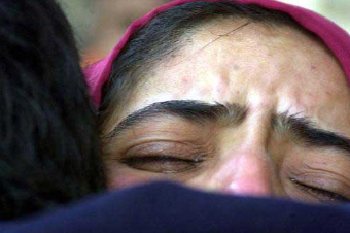 It is appropriate, at many levels, to start our New Year Post with the same verse we used at this time last year. The sentiment of the sheyr is even more true now than it was a year ago.
It is appropriate, at many levels, to start our New Year Post with the same verse we used at this time last year. The sentiment of the sheyr is even more true now than it was a year ago.
Har saal yeh samajh keh guzara hai aye _Saba_
Yeh ishq ki saddi meiN adaawat ka saal hai
As we look back at the events and people and news of 2007, two thoughts immediately strike us. First, there is relief that this year – which has been so sad and tragic in so many ways – is coming to a close. Maybe, just maybe, what follows will be better. Second, if there was any one and only one thing that defined the year 2007, that thing was the manifest anger and angst that defines Pakistani society today.
Anger was the face of Pakistan in 2007.
The one that that defined Pakistan in 2007 more than all others – more than Benazir Bhutto and her tragic end, more than Pervez Musharraf and all his political machinations, more than the lathi-waving vigilantes of Lal Masjid, more than Iftikhar Chaudhry and his judicial assertiveness, more than Aitizaz Ahsan and his legal struggles, more than civil society‘s struggles for democracy, more than the media and its battles for independence, more than anything else that one can think of – that one thing was the latent anger in society.
For Pakistan and Pakistanis, 2007 was the story of this anger erupting ever so violently, at every possible opportunity, in every which way, and in all its many possible manifestations.
This anger has been spilling all year long on the streets of Pakistan in the form of slogans, batons, bricks, sticks and – all too often – blood. As we look back at our year of blogging we find that we have written about this anger more often than just about anything else. And each time we have written about the anger people have become more angry at us for even questioning their anger. The anger with which people have justified their own anger is probably the most disturbing of all.
The violent death of Benazir Bhutto and the even more violent reactions to that on the streets of Pakistan have been the most recent, most dramatic and most poignant representations of this national sense of outrage and angst. But the anger has been a constant theme throughout the year. More than that, our own angst comes from the repeated justification of this anger and a societal acceptance of violence (physical, verbal, emotional) as a legitimate tool of political action and of social expression.
What has disturbed us consistently and increasingly through the year is how many good people are willing to justify violence and anger as the means of achieving what they consider to be valid social goals. What is also clear is that this justification of anger is not restricted to any group or ideology. Some religious activists justify violence because they seek to purify Pakistan, but so do some liberals who are rooting for democracy and rule of law. Government is ready to express their authority through violence but so is civil society. This, of course, is not a case of moral equivalence and the violence of those who have power is different from the violence of those who do not. But at the end of the day blood spilled on a street is blood spilled on a street. It is the sanctity of that blood – no matter whose blood it is – that has been totally thrashed this year.
If you have the time, go and follow any of the heated discussions on our posts relating to anger this year. Focus, if you will, on how different groups will justify their own or someone else’s anger. It is this acceptance of the legitimacy of anger, and therefore of violence, that defined 2007 for Pakistan and which made this such a tragic year for all of. Look for example, at this story we did very year in the year (Feb. 21) on the murder of a woman Minister in the Punjab by a religious fanatic. We wrote then:
What killed Zille Huma Usman? Not religion. Not madness. But anger. Uncontrolled anger.
Note the comments of some of our friends who seemed less concerned about the woman who had been brutally murdered than about our questioning the anger in society. But the anger was around us all year round, everywhere.
- The anger there is in the suicide blasts that came in so frequently that by the end of the year we were not even writing about them. Our first suicide blast story of the year was in January 2007, but there were many more to follow, eventually we stopped having separate posts on each.
- The anger was there in a famous sports star (cricketer Moin Khan) beating his wife (note again the vehemence of the justifications of this violence).
- The anger was clearly there in the already mentioned case of the brutal murder of Zille Huma.
- The anger was there in foreign affairs when the friendship train between India and Pakistan, Samjhoota Express was blown up.
- It turned out not to be murder (thankfully) but the anger was clearly there in the national discussion surrounding the death of Pakistan’s cricket coach Bob Woolmer.
- The anger was predominant in the vigilantism of laathi-wielding puritanicals who came to be known as the Lal Masjid Brigade kidnapping people they did not approve of.
- Of course, the very removal of the Chief Justice in the first place was nothing except about anger.
- The anger became particularly ugly when the government started manhandling the Chief Justice and lawyers.
- The anger has always been prominent in the way that some of our government Ministers talk; especially then Law Minister Wasi Zafar.
- The government’s anger was clear to see when it banned popular TV talk shows and clamped down on the media.
- The violence from Lal Masjid erupted yet again, every time more violently.
- If a poster for societal anger is needed it has to be this picture of a man beating his wife. Once again, it was the justification of this anger by some that was most disturbing.
- There was the anger of those who would deny polio vaccination to children for fear of deep dark conspiracies.
- May 12 and the mayhem in Karachi probably represented the anger in society as tragically as any other in our history.
- We were also reminded by our writers that being exposed anger can be a daily reality for some, for example on gender issues.
- But let us also not forget the anger that was not there. For example, at the devastation caused by and the lack of support for the Baluchistan cyclone.
- This was a year when even something as innocuous as a movie would bring forth the immense anger in society.
- Ultimately what had started so violently in Lal Masjid ended even more violently.
- Even as our anger was focussed on the main cities, even more anger kept brewing up with extremism in the North and Northwest of Pakistan.
- Anger and violent politics wer the dominant emotion again when fomer Prime Minister Nawaz Sharif was unceremoniously deported upon his arrival in Pakistan.
- Anger was, of course, not restricted to any group. Lawyers who had themselves been victims of anger, lashed out angrily against Naeem Bokhari and then against Ahmed Raza Kasuri.
- The cycle of state violence, this year especially against lawyers, was not to stop and was a product of as well as a creator of further anger in society.
- The anger of the famous also was evident, as for example in Pakistan’s bad-boy cricketer Shoaib Akhtar.
- The anger kept brewing especially because people realized that they controlled nothing in their own destiny; that everything was open for manipulation.
- The anger that foretold of the anger to come was on bomb blast at the return of Benazir Bhutto to Pakistan.
- The anger had its costs as others would refuse to have to deal with it, as for example in the cricket match with South Africa.
- The declaration of Emergency was violence and anger by policy at its worst.
- Even icons like Imran Khan were not spared in these orgies of violence.
- With the Emergency the crackdown on the media was even more angry. The good news was that here we did begin to see some who choose to protest without violence. These in the civil society hold out the greatest hope. But the anger of everyone led to violence by and against the government.
- In all the ‘Emergency’ racket there was other anger and violence that we did not even notice, for example with the destruction of the Buddhas in Swat.
- Outside of politics, the killing and the manner of killing of artist Gulgee was yet a different manifestation of our societal violence and anger.
- The emergency was ultimately lifted, but the clouds of violence and anger persist.
- And, ultimately, the year closed with that tragic display of violent anger in the killing of Benazir Bhutto and then the outpouring of societal anger on our streets.
The above were all not direct manifestations of anger, but they were all contributors to or reactions to anger and violence of various forms. We realize that anger and violence is not unique to Pakistan. We live in a world where violence is increasingly used and justified everywhere, including by the biggest powers of the world. But this post or this blog is not about them. This is about Pakistan. The anger and the violence of others cannot be a justification of our own anger and violence. If we are to have any credibility in speaking out against the violence of others, then we must first restrict our own.
Here at ATP we see a manifestation of this anger every day in our comments (and these from the more literate and affluent Pakistanis, many living abroad). In recent months especially, these comments have been simply a chronicle of national angst and anger with less and less substance to them. Even after having to moderate out 20% or more of the comments from people on all sides of all issues, what remains is a testimony to the sad conclusion that as a society we may now be incapable of disagreeing without being disagreeable. It seems that some of us cannot even discuss Rooh Afza without questioning someone else’s patriotism or religious piety!
All of this is, of course, an incomplete picture. It is meant to be incomplete. As our posts all across the year have also shown, there is much in Pakistan – much more than this – which is good and positive and very worth being proud of. We highlight the anger today in this end-year post, not because this is the only thing that represents Pakistan today, but that this has grown to alarming proportions in this year and we, as Pakistanis, must rise against this anger and this violence. Indeed, as we noted above, there are some in the civil society who have chosen to reject the protest of violence and choose the protest of principle. We must stand with them and against violence.
For the sake of our future and for the hope of the future we must confront this anger of ours and resisit all and any justifications for violence. The first step in solving any problem has to be to recognize and name the problem. That is what we are trying to do today. Please join us in doing so!
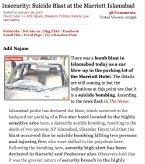
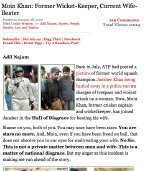
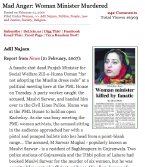
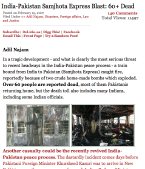
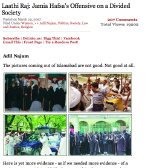
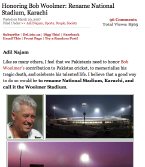
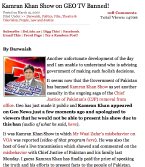
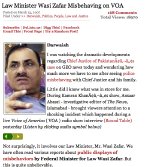
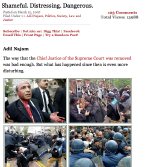
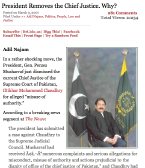
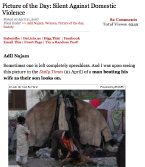
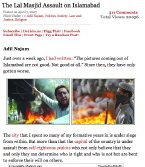
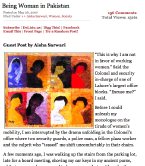
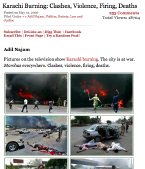

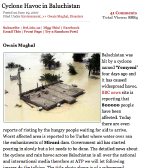
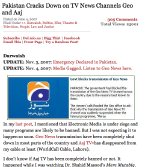
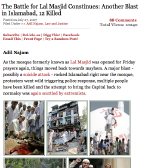
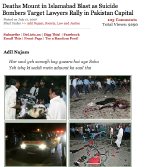
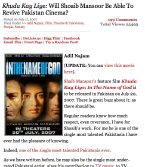
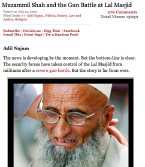
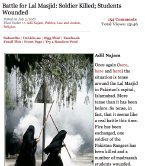
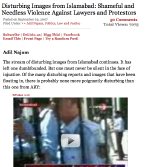
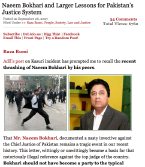
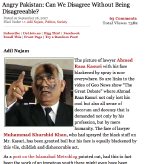
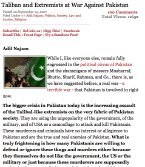
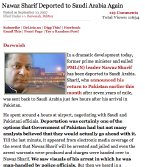
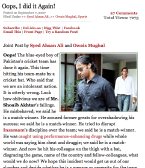
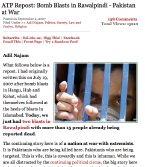
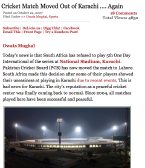
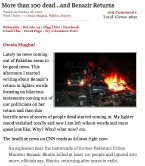
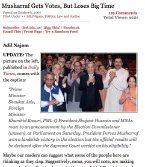
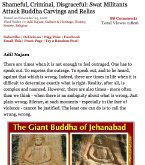
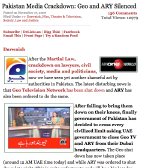
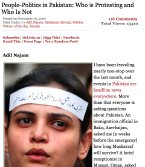
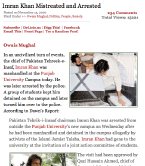
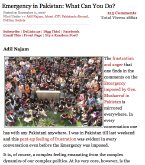
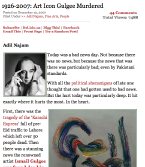
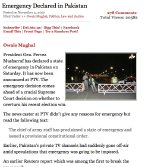
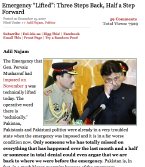
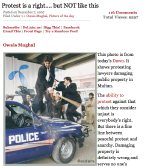
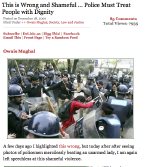
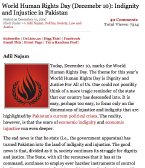
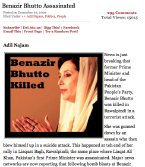
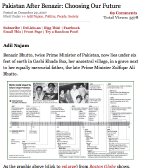



















































Happy new year and best wishes to everyone at Pakistaniat. I pray the dark clouds are gone in 2008.
I also want to thank Dr Najam and Dr Mughal for creating this great place where we can all be Pakistani . My thanks to you.
Good post. You have identified the cause. Now give a solution…. how does one control his anger?
One thing that you have missed is that, in most cases of voilence in the streets, only 15 to 20 percent of the people are really angry, the rest are their for shughal. This is a fact as I have been on the other side for 5 years during my time at an engineering university.
The nation needs to learn from our neighbouring country’s leader Ghandi who once said “Eye for an eye would make the whole world blind”. And thats exactly what is happening to Pakistan unfortunately.
If we are angry due to one or the othe reason, we need to understand that using violence to express it will not take the country anywhere……….. but perhaps things like civil disobidence and non-violent protests is too much to ask from a nation that belives and expects instant results!!
I like the post. At first read I thought there are so many types of angers that all seemed to be lumped together in the post; perhaps there is a need to dissociate and look at them separately. However, with bit of a thought I reached a different conclusion.
It is the persistent and deliberate type of anger that has caused the most visible and deep wounds on our society and is the one that needs to be dealt at societal level. Psychology would diagnose strong under-currents of feelings of injustice, and being violated. We would all tend to agree with that.
Flash anger, which is typically in response to a threat, can also persist, if one feels under *constant* siege and threat. Unfortunately, a number of us perceive to be besieged and under a constant onslaught.
The third kind is a personality trait, and would typically be something that we would not deal with collectively. Unfortunately, persistence makes habits, and habits become non-differentiable from traits.
So it is really difficult to dissociate the different kinds of anger in our society.
The question then is how to mitigate the threat and injustice where it is real and correct the perception where it is false.
That is were we all start to disagree; the ones who are not angry, angrily start squashing and complaining about anger of the angry ones. The angry ones think that they are being further unduly subdued. And alas the cycle continues. (Listen to Benazir’s angry speech complaining about extremists on the day of sad attack, for an example. What followed minutes later unfortunately wrote one of the darkest chapters in this seemingly never ending book of chaos.)
What we need is a voice of sanity and ‘tadbeer’; we must hold the fort but at the same time break the cycle by not making things worse. Mitigate the threats, do the justice, and correct the perceptions. Easier said than done.
It is not anger, but unconstrained violence in us, that is our bane. We are violent as individuals, as family, as community, as nation. We are violent even when not angry. We are violent to the extent of being almost Neanderthals, lesser humans. We are violent for nothing.
We burn and pillage to demonstrate our anger. We burn and pillage to display our power, too. We burn and kill in mourning. We burn and kill in victory. And defeat.
We take kick out of kicking animals. We have no qualms in being violent to our children. We are aggressive towards weak